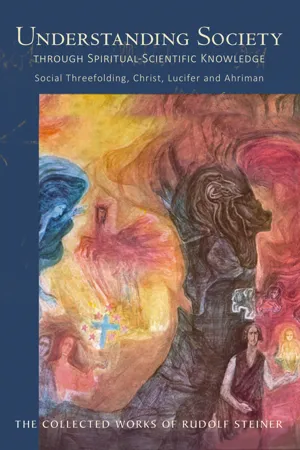
UNDERSTANDING SOCIETY
Through Spiritual-Scientific Knowledge. Social Threefolding, Christ, Lucifer and Ahriman
- 280 pages
- English
- ePUB (mobile friendly)
- Available on iOS & Android
UNDERSTANDING SOCIETY
Through Spiritual-Scientific Knowledge. Social Threefolding, Christ, Lucifer and Ahriman
About this book
In the uncertainty following the end of the First World War, Rudolf Steiner perceived a unique opportunity to establish a healthy social and political constitution. He began lecturing throughout post-war Germany, often to large audiences, about his social ideas. Here, speaking to a more intimate grouping at the Goetheanum in Dornach, Switzerland, Steiner seeks to deepen the themes of social threefolding, showing specifically how new social thinking is integral to anthroposophy.Steiner speaks of the superficiality of the materialistic view of history, originating with the economic shift amongst the population at the time of the Reformation. Back in Egyptian-Chaldean times, initiates ruled out of spiritual impulses. Later, in the Greco-Roman period, priests had power over their congregations. Today, homo economicus – or 'economic man' – has become the dominant idea, with the capitalist and the banker taking control. But the healing of social relationships can only come about through different modes of thought; the life of spirit must be separated not only from politics but also from economics. True social understanding allows for comprehension of karma – the appreciation of each person's individual destiny. In parallel, says Steiner, we should work towards a global consciousness, as true social ideas are founded on people feeling themselves to be citizens of the world.In an important corollary, Steiner studies the incarnations of three significant spiritual beings in human evolution: Lucifer, Christ and Ahriman. Lucifer incarnated in the third pre-Christian millennium, Christ incarnated at the dawn of a new age, whilst an incarnation of Ahriman in the West is immanent. Ahriman is preparing this incarnation by insidiously promoting various ideas, for example that economic security is sufficient for healthy public life. A new wisdom must be achieved out of free human will, says Steiner, or else we will succumb to Ahriman.
Frequently asked questions
- Essential is ideal for learners and professionals who enjoy exploring a wide range of subjects. Access the Essential Library with 800,000+ trusted titles and best-sellers across business, personal growth, and the humanities. Includes unlimited reading time and Standard Read Aloud voice.
- Complete: Perfect for advanced learners and researchers needing full, unrestricted access. Unlock 1.4M+ books across hundreds of subjects, including academic and specialized titles. The Complete Plan also includes advanced features like Premium Read Aloud and Research Assistant.
Please note we cannot support devices running on iOS 13 and Android 7 or earlier. Learn more about using the app.
Information
Table of contents
- Cover Page
- Title Page
- Copyright Page
- Contents
- Introduction by Matthew Barton
- Lecture 1 Dornach, 3 October 1919
- Lecture 2 Dornach, 4 October 1919
- Lecture 3 Dornach, 5 October 1919
- Lecture 4 Dornach, 10 October 1919
- Lecture 5 Dornach, 11 October 1919
- Lecture 6 Dornach, 12 October 1919
- Lecture 7 Dornach, 17 October 1919
- Lecture 8 Dornach, 18 October 1919
- Lecture 9 Dornach, 19 October 1919
- Lecture 10 Dornach, 23 October 1919
- Lecture 11 Dornach, 1 November 1919
- Lecture 12 Dornach, 2 November 1919
- Lecture 13 Dornach, 9 November 1919
- Lecture 14 Dornach, 14 November 1919
- Lecture 15 Dornach, 15 November 1919
- Notes
- Rudolf Steiner’s Collected Works
- Significant Events in the Life of Rudolf Steiner
- Index